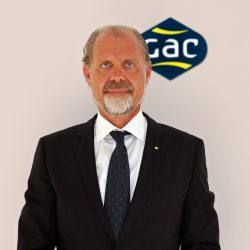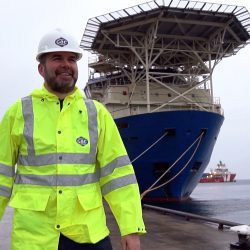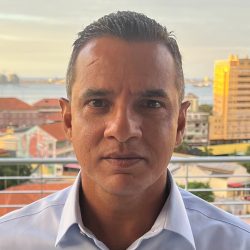The 27th Conference of the Parties to the United Nations Framework Convention on Climate Change (COP27) ended last weekend with the promise to establish a loss and damage fund to help developing countries that have contributed little to the climate crisis but are vulnerable to its adverse effects.
UN Secretary-General António Guterres welcomed the move as “an important step towards justice”, but noted that the conference had failed to address the ambition to limit global warming to 1.5°C.
“We need to massively invest in renewables and end our addiction to fossil fuels,” he said, adding that he is pushing for a Climate Solidarity Pact to mobilise governments, international financial institutions and the private sector to play their part. “We need all hands on deck to drive justice and ambition.”
The GAC Group has embarked on its own Roadmap To Sustainability for a cleaner, greener future. Around the world, GAC people are working hard to reduce the impact of their operations on the planet. Here’s what some of them had to say about COP27 and the way forward.
“GAC needs to listen and to adapt. The renewable fuel landscape is changing daily, and although developments have been delayed by the war in Ukraine, the challenges the industry faces to decarbonise have not disappeared.
We must do more to understand customer requirements and provide solutions.”
Nicholas Browne, Global Director – GAC Bunker Fuels and Head of GAC’s Sustainability Working Group

“COP27 highlighted the importance of everyone – governments, businesses, communities and individuals – working to cut carbon emissions before it is too late.
At GAC Singapore, we are measuring emissions produced by our activities and those of our staff as they go about their business, and taking steps to reduce them. In the past year, we have reduced our emissions by nearly 15% - something we are very proud of. But we cannot sit back in the satisfaction that we have ‘done our part’. It is just a start and we will continue to identify and implement ways to reduce our impact on the environment, and encourage our customers to do the same.”
Sofie Bager, Managing Director of GAC Singapore

“Australia is the largest exporter of coal globally. While coal will continue to be a necessary commodity, particularly for developing countries, and Australian coal is arguably ‘cleaner’ than most competitors, we must help to financially support poorer countries on their transition away from fossil fuels.
Responsibility must be taken at all levels. While GAC’s sustainability strategy is led by senior management, awareness and an understanding of the requirements for sustainable business practices for living and working in the current and future world is the responsibility of every single staff member within the organisation.”
Scott Henderson, GAC Australia Managing Director

“Steps taken by GAC to measure our carbon footprint and switch to sustainable materials show a genuine commitment to contribute. Beyond creating awareness, we must take the initiative for projects such as zero-waste living, sustainable swaps and emission regulation which our employees, families and customers can volunteer to get on board with long-term. As part of the supply chain, we have control over bigger issues including vehicular pollution, materials used for transportation and packaging, and a responsibility towards the health of the marine eco system. In coordination with other industry players, GAC could drive projects that will help us live in a post-COP27 world.”
Miriam Mathews, GAC India Director

“The fastest way for the shipping and fossil fuel sector to respond is through regulation. IMO and government regulations are required to push all involved to make the necessary investments. This has been done earlier for both Sulfur and NOX emissions. If a private entity wants to invest in decarbonisation voluntarily they will quickly be priced out of the market, which is not sustainable. A good example can be seen in Norway where offshore vessels’ carbon emissions are regulated, forcing all vessel operators to make the necessary investments.”
Erland Ebbersten - Group Vice President Marine & Energy

“There is a massive drive within the energy industry towards the goal of net zero. We are following developments with interest, including the Innovation and Targeted Oil & Gas (INTOG) leasing round for offshore wind projects, an initiative that will reduce emissions from oil & gas production and boost further innovation, due to be announced soon. It links directly to the UK Government North Sea Transition deal and will be interesting to watch the electrification of oil & gas infrastructure and assets.
Offshore wind will play a huge part in the road to net zero. ScotWind projects run by Crown Estate Scotland will contribute hugely the country’s net zero aspirations.
At GAC UK we are interested in the plans of the many owners and operators we work with for innovative low-emission vessels to be fuelled solely by renewable fuels.”
Adrian Henry, GAC UK General Manager – UK Agency

“The world collectively needs to act now to reduce its dependency on fossil fuels to drastically reduce emissions. Our planet is ‘still in the emergency room’ and the clock is ticking as we have already reached the midway point between the Paris Climate Agreement and the 2030 deadline. We must aggressively invest in renewables and reduce our reliance on fossil fuels.”
Carlos Escudero, Group Business Development Director – Exploration & Production, GAC North America

“With demand for fossil fuels reaching its peak and the world looking toward hydrogen as the fuel of the future, I believe that Trinidad & Tobago has an opportunity to be first in line in the region’s energy.
We have seen several companies investing in and maximising current facilities in Trinidad towards the future challenges discussed at COP27. The newly launched HDF TT is set to begin many local hydrogen projects. It has a 70% stake in the Kenesjay Green Ltd ‘NewGen project’ to construct a clean hydrogen producing electrolysis facility – the largest of its kind in the world.”
Ravindu Rodrigo, GAC Trinidad & Tobago Managing Director

“Shipping contributes around 3% of world CO2 emissions. While many new vessel builds have environmentally-friendly propulsion systems and green fuels, there will still be significant vessel tonnage where upgrades to install greenhouse gas reduction measures will be difficult.
Vessel owners can use route optimisation, slower vessel steaming, and regular hull and propellor polishing to help to reduce emissions and costs. But that’s not enough. New initiatives, such as the use of renewable energy, can accelerate the reduction of emissions. Some industry players are offering complementary wind propulsion which can cut fuel consumption by up to 30%.
The 2018 Initial IMO GHG Strategy is due to be revised in 2023. That should include mandatory measures to continue to reduce the emissions of the world’s vessel fleet.”
Kevin Green, GAC Business Development Manager, Energy Projects - Europe

“State and private organisations in the maritime sector should have plans in their ‘Green Corridor Roadmaps’ to reskill/upskill their workforce and build new green skills, create opportunities to work across zero-emission vessels and a zero-carbon fuel supply chain.
Maritime companies, including those in the oil & gas sector, are moving away from fossil fuels, opting for low carbon-emitting fuels such as LNG. Even though there is a short-term financial impact, it’s vital that they show leadership with solutions, such as new green fuels and demonstrating the viability of innovation in clean energy production to decarbonise international shipping.
Powerful nations are being called upon to lead in making a definable difference rather just promises at global summits.”
Kosala Wijesinghe, GAC Angola General Manager
